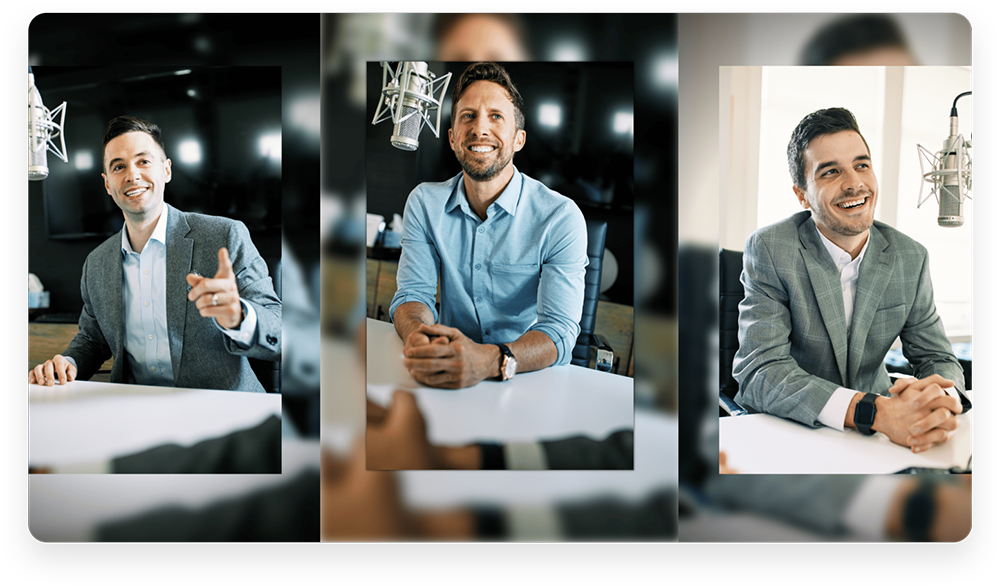Retire While You Work® Podcast
Join us as we discuss various topics to help you find the path to viewing money as a means to the true currency, TIME, and learn how to build more memories and experiences.
View All EpisodesJoin us as we discuss various topics to help you find the path to viewing money as a means to the true currency, TIME, and learn how to build more memories and experiences.
View All Episodes
What if you could do what you're passionate about and achieve a work-life balance? What if you were relieved of the pressure to have some massive amount saved?
Learn More
Now more than ever, due to the technological advances we have seen over the past few years, we are living in a world full of freelancers, independent contractors, side-hustles, and commission-based jobs. With these types of jobs come fluctuating income based upon work completed, instead of salary or hours worked. However, this doesn’t necessarily mean that your savings should fluctuate as well. Even with a fluctuating income, there are still plenty of ways to save, invest, and budget to meet all of your goals.
The first and best way to help allow you to save each month is to calculate your baseline amount that is needed for your monthly expenses. Once you have this amount down, this will help set your budget. Now, everything over this can be used to go towards investing, saving, or other discretionary expenses. One thing I would add into your “budget” is a monthly amount that you can commit to investing each month. We call this “the reverse budget,” or “paying yourself first.” Over the years, we have found that if you think of this as a non-negotiable habit, it will become much more consistent, rather than waiting to see what is left at the end of each month to invest. Typically, if one chooses the latter, investing does not happen.
In today’s world, there are plenty of budget and savings apps to help put this all together or help to systematize it. If you are working with an accountant or a CPA, they can also help get you on track and ensure your expenses are in line with the average monthly income you are bringing in.
Another tip to try is to stay a month or quarter ahead on expenses and only live on money from the previous month or quarter. Doing this will help you to keep a buffer or a cash reserve, so that even as you get close to the end of the month or quarter, you know that all of the income from the previous pay window will be there for you.
Additionally, build up a solid emergency fund. Fluctuating income can come in waves and, depending on your industry, it may be higher or lower depending on the seasons or amount of product you need to move to get paid. If this is the case, be sure to have a hefty emergency fund – at least 6 months and as much as 12 months – in addition to any big expenses you will have in the next year. Having this built up is going to remove a tremendous amount of stress because if you go through a month or two of low to no income, you know you still have cash in the bank to meet your needs.
Being a freelancer, independent contractor, side-hustler, or any other commission-based position has a lot of benefits. It allows you to set your own schedule and decide who you do or do not want to work with. It also puts all of your income making potential on you and you alone. Having a plan in place that will allow you to focus on your business and not have to worry about the money side of things will allow you to do better work. Doing better work will create happier clients, which in the end, should lead to more and higher income, allowing you to do and achieve all of your personal and financial goals.


Adams Wealth Partners, LLC is not a registered broker/dealer and is independent of Raymond James Financial Services. Investment advisory services offered through Raymond James Financial Services Advisors, Inc. Securities offered through Raymond James Financial Services, Inc., member FINRA/SIPC
Neither Raymond James Financial Services nor any Raymond James Financial Advisor renders advice on tax issues, these matters should be discussed with the appropriate professional.
Links are being provided for information purposes only. Raymond James is not affiliated with and does not endorse, authorize, or sponsor any of the listed websites or their respective sponsors. Raymond James is not responsible for the content of any website or the collection or use of information regarding any website's users and/or members.
The running stock ticker is not a recommendation to buy or sell stocks of the companies pictured.

Securities offered through Raymond James Financial Services, Inc., member FINRA/SIPC, marketed as Adams Wealth Partners. Investment advisory services offered through Raymond James Financial Services Advisors, Inc.Adams Wealth Partners is separately owned and operated and not independently registered as a broker-dealer or investment adviser.
Certified Financial Planner Board of Standards Inc. owns the certification marks CFP®, CERTIFIED FINANCIAL PLANNER™, CFP® (with plaque design) and CFP® (with flame design) in the U.S., which it awards to individuals who successfully complete CFP Board's initial and ongoing certification requirements. CFP® holders at Adams Wealth Partners, LLC are: David Adams, Myles Zueger, Carson Odom, and Spencer Provow
CPA holders at Adams Wealth Partners, LLC are: David Adams, Carson Odom, and Christine Kinsley
Please note that all archived content is for informational purposes only. Investment decisions should not be based on the content provided herein. For the most up-to- date statistical information and analysis, please contact your financial professional.
Raymond James financial advisors may only conduct business with residents of the states and/or jurisdictions for which they are properly registered. Therefore, a response to a request for information may be delayed. Please note that not all of the investments and services mentioned are available in every state. Investors outside of the United States are subject to securities and tax regulations within their applicable jurisdictions that are not addressed on this site. Contact your local Raymond James office for information and availability.

The 2024 Forbes ranking of America’s Top Wealth Management Teams Best-In-State, developed by SHOOK Research, is based on an algorithm of qualitative criteria, mostly gained through telephone and in-person due diligence interviews, and quantitative data. This ranking is based upon the period from 3/31/2022 to 3/31/2023 and was released on 01/09/2024. Advisor teams that are considered must have one advisor with a minimum of seven years of experience, have been in existence as a team for at least one year, have at least 5 team members, and have been nominated by their firm. The algorithm weights factors like revenue trends, assets under management, compliance records, industry experience and those that encompass best practices in their practices and approach to working with clients. Portfolio performance is not a criteria due to varying client objectives and lack of audited data. Out of approximately 10,100 team nominations, 4,100 advisor teams received the award based on thresholds. This ranking is not indicative of an advisor's future performance, is not an endorsement, and may not be representative of individual clients' experience. Neither Raymond James nor any of its Financial Advisors or RIA firms pay a fee in exchange for this award/rating. Raymond James is not affiliated with Forbes or Shook Research, LLC. Please see https://www.forbes.com/lists/wealth-management-teams-best-in-state/ for more info.
Barron’s Top 1,200 Financial Advisors 2023, is based on the period from 09/30/2021 - 09/30/2022 and was released on 03/15/2023. 5630 nominations were received and 1,200 won. Neither Raymond James nor any of its advisors pay a fee in exchange for this award. More:https://www.raymondjames.com/award-disclosures/#2023-barrons-top-1200
Please note that all archived content is for informational purposes only. Investment decisions should not be based on the content provided herein. For the most up-to- date statistical information and analysis, please contact your financial professional.
Raymond James is not affiliation and does not endorse the above-mentioned organizations.
Nashville Wealth Management & Financial Advisors | David Adams CPA, CFP® | Copyright © 2024 | Privacy Notice | Legal Disclosure
